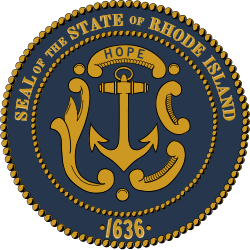| |||||||||||||||||
| |||||||||||||||||
 County results Hoppin: 70–80% 80–90% 90–100% | |||||||||||||||||
| |||||||||||||||||
| Elections in Rhode Island |
|---|
 |
The 1855 Rhode Island gubernatorial election was held on April 4, 1855, in order to elect the governor of Rhode Island. Incumbent Whig governor William W. Hoppin won re-election against Democratic nominee Americus V. Potter. [1]

